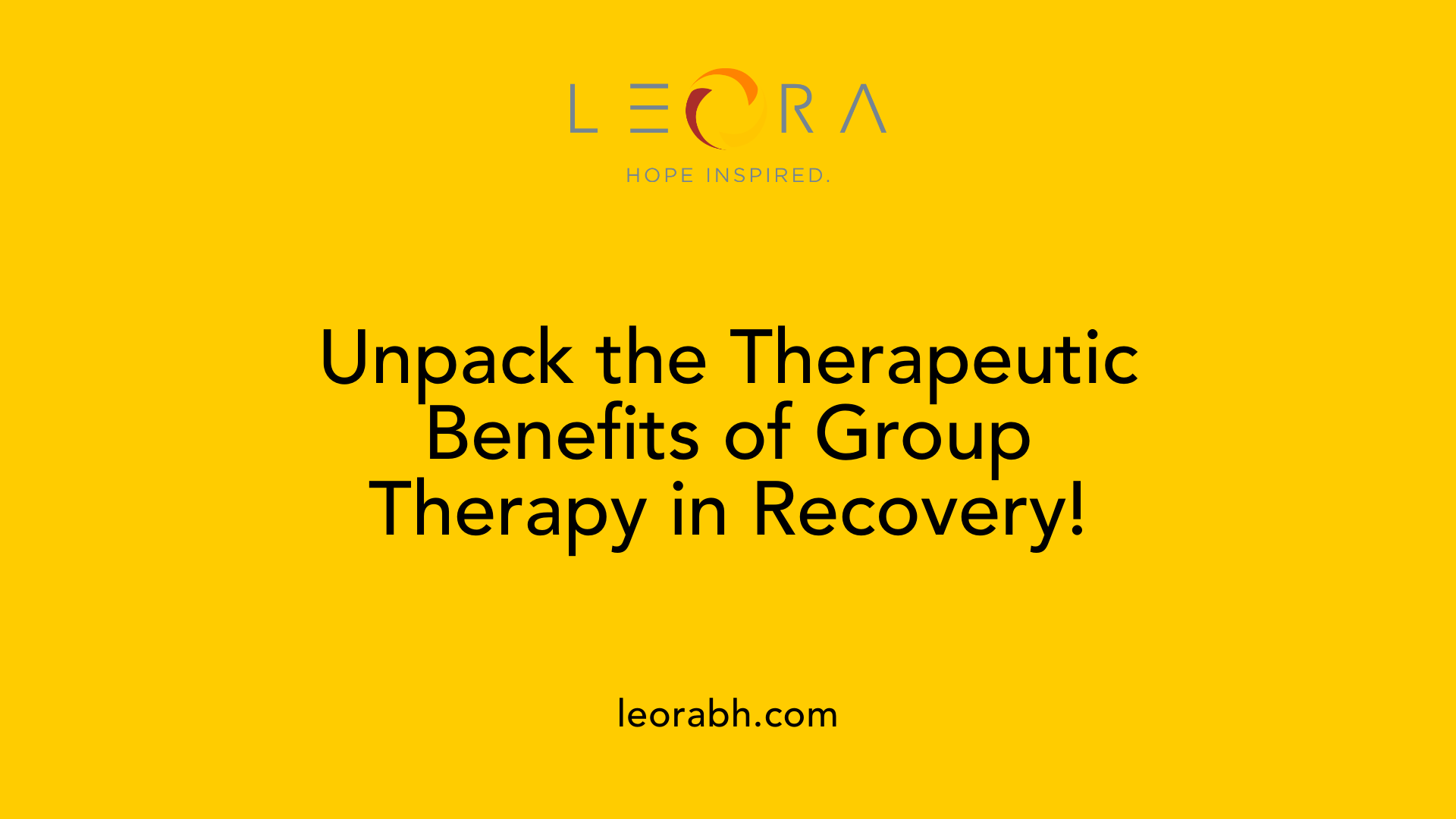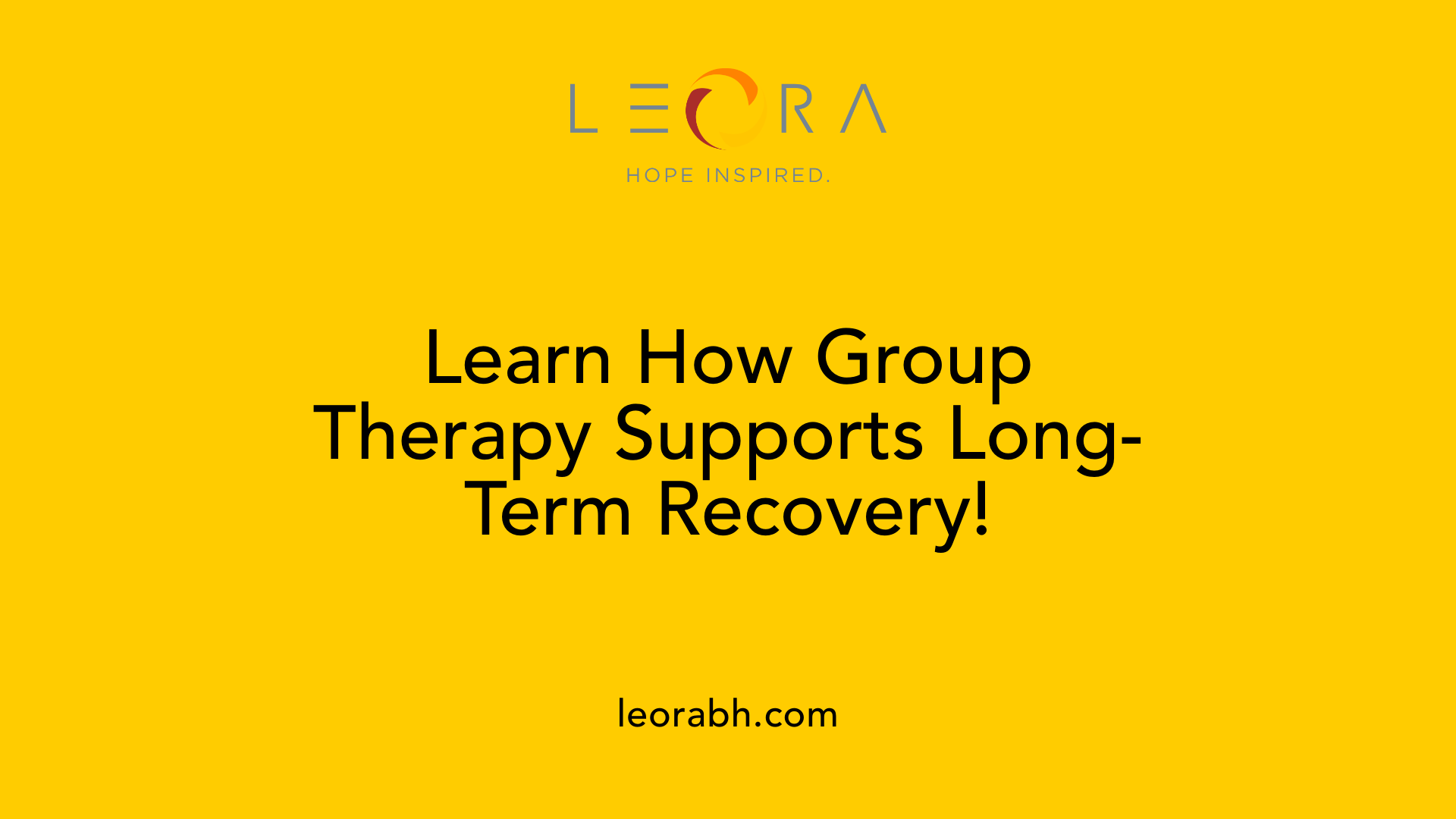How to Get the Most Out of Group Therapy in Addiction Treatment
Harnessing the Power of Group Therapy for Addiction Recovery
Introduction
Addiction recovery is a challenging journey that requires comprehensive treatment approaches. Among the various modalities available, group therapy stands out as a powerful tool for individuals seeking recovery. It's not just about confronting addiction in isolation but learning and healing within a community. This narrative explores how individuals can maximize the benefits of group therapy, understand its therapeutic value, and effectively integrate it with other treatments for lasting recovery.
The Prevalence and Appeal of Group Therapy in Addiction Treatment

Why is group therapy a popular treatment for addiction?
Group therapy has gained significant traction as a preferred treatment for addiction due to its unique emphasis on peer support. This modality allows individuals to connect with others who are navigating similar challenges. The community aspect of group therapy fosters feelings of belonging and reduces isolation, which is vital for recovery. Participants share personal stories, successes, and setbacks, creating a supportive atmosphere that enhances interpersonal skills alongside recovery strategies.
Research supports the effectiveness of peer support, indicating that engagement in group therapy can lead to higher abstinence rates and increased satisfaction with treatment. In fact, many studies have shown that individuals involved in peer support programs exhibit significantly lower relapse rates and reduced substance use over time. Notably, the collaborative environment encourages open communication, allowing participants to learn from each other's experiences, which can be crucial for personal growth and understanding.
Moreover, approximately 93% of substance use disorder (SUD) treatment facilities provide group counseling, a testament to its widespread acceptance in treatment plans. The versatility of group therapy also enables it to address a wide range of substance use issues, making it applicable for diverse populations seeking recovery.
Overall, the combination of shared experiences, mutual support, and the development of communication skills establishes group therapy as not only a popular choice but also an effective intervention in the landscape of addiction treatment.
Exploring the Therapeutic Benefits of Group Therapy

What are the therapeutic benefits of group therapy in addiction recovery?
Group therapy provides a wealth of therapeutic benefits for individuals in addiction recovery. One of its primary advantages is the promotion of social support. Participants not only share their experiences but also learn from each other's journeys, fostering a sense of belonging. This collaborative environment diminishes feelings of isolation and combats the stigma often associated with addiction.
In group settings, individuals engage in various activities that help build essential interpersonal skills. Group therapy typically consists of 6 to 12 clients, all guided by trained therapists, facilitating a safe space for sharing. Research indicates that around 93% of substance use disorder treatment facilities offer group counseling, emphasizing the modality's crucial role in improving treatment engagement and retention.
How does group therapy help in overcoming isolation?
Isolation can be a significant barrier to recovery. Group therapy effectively addresses this issue by creating a supportive community where members can express themselves without fear of judgment. Participants frequently report feeling less alone as they discover peers facing similar struggles. This shared experience not only alleviates feelings of shame—often linked to addiction—but also strengthens their resolve to stay sober. The interactions within the group can help individuals recognize emotional triggers and develop healthy coping mechanisms.
How does group therapy assist in building interpersonal skills?
Building interpersonal skills is another significant benefit of group therapy. The therapeutic alliance between group members allows for authentic communication, fostering empathy and constructive dialogue. Participants practice giving and receiving feedback within a non-judgmental setting, helping them improve their social skills.
Moreover, various forms of group therapy—such as cognitive-behavioral groups, skills development sessions, and support groups—focus on diverse topics including goal setting, self-care, and trauma, all of which are vital for recovery.
In summary, group therapy not only enhances individual recovery but also instills a sense of community, essential for long-term health and sobriety.
Integrating Group Therapy with Other Modalities
How does group therapy integrate with other therapeutic modalities in treating addiction?
Group therapy serves as a vital component in the treatment landscape for substance use disorders, facilitating integration with various therapeutic modalities. One of the most effective combinations involves Cognitive Behavioral Therapy (CBT). Research indicates that when group therapy is paired with CBT, the empirical support for improving outcomes in addiction treatment becomes more robust. This integration addresses both the cognitive distortions that often accompany addiction and the behavioral patterns that need modification for long-term recovery.
Moreover, integrating group therapy with Contingency Management (CM) can further reinforce positive behaviors. CM employs a rewards system to encourage desirable behaviors, such as abstinence from substances. When participants engage in group settings enriched by CM principles, they can share experiences, celebrate successes, and provide mutual reinforcement, enhancing their motivation to stay sober.
What about co-occurring treatments?
Another important aspect is the treatment of co-occurring conditions like depression and anxiety alongside substance use disorders. Group therapy provides a space where individuals can discuss not just their addiction but also the emotional and psychological challenges they face. This holistic approach fosters an environment conducive to healing and allows therapists to adapt interventions based on shared experiences among participants.
By incorporating group therapy with various methodologies like Motivational Interviewing, Community Reinforcement Approach, and Behavioral Couples Therapy, treatment becomes more comprehensive. These interdisciplinary efforts address the multiple dimensions of addiction, ultimately improving the likelihood of lasting recovery.
Group therapy’s collaborative nature ensures that participants gain essential social support and learn skills that are crucial for everyday interactions and ongoing recovery, making it a cornerstone of effective addiction treatment plans.
Practical Strategies for Active Participation

How can someone maximize the benefits of participating in group therapy?
To maximize benefits in group therapy, active participation is key. This means focusing on the current dynamics during sessions, tuning into personal feelings and the experiences of others. Sharing genuine thoughts creates a real connection that enhances the overall experience.
Openness and honesty foster trust. Participants should aim to express their true emotions rather than rehearsed lines, as this authenticity promotes deeper engagement. Beneficial interactions occur when members feel safe sharing their internal thoughts without fear of judgment.
Importance of Feedback and Communication
Giving and receiving feedback is vital for nurturing communication within the group. It’s essential to create a culture where feedback is specific and compassionate. This not only improves understanding among participants but also helps individuals refine their communication skills.
Avoiding unsolicited advice encourages members to feel validated in their experiences, enhancing trust. Instead, fostering a listening environment prior to offering suggestions can lead to more fruitful discussions.
Non-Verbal Cues
Non-verbal communication plays a crucial role in group settings. Observing body language, eye contact, and other non-verbal cues helps participants gauge emotions and reactions that words alone may not convey. By attentively watching these dynamics, individuals can better understand their peers' perspectives and enhance the therapeutic rapport.
In summary, engaging fully through sharing, constructive feedback, and attentively observing non-verbal interactions can significantly enrich the group therapy experience, leading to a more supportive and effective recovery environment.
Types of Group Therapy and Their Benefits

Different Types of Group Therapy
Group therapy takes various forms, each tailored to meet specific needs during addiction recovery. Here are some key types:
| Type of Group Therapy | Focus Area | Description |
|---|---|---|
| Psychoeducational Groups | Education about addiction | These groups provide crucial information about substance use and recovery strategies. |
| Skills Development Groups | Coping skills | Focuses on teaching practical skills for managing stress and preventing relapse. |
| Cognitive Behavioral Groups | Cognitive strategies | Utilizes CBT principles to address thought patterns and behaviors related to addiction. |
| Support Groups | Peer support | Offers a nurturing environment for sharing experiences and learning from each other. |
| Interpersonal Process Groups | Relationship dynamics | Encourages sharing and vulnerability while exploring relationships among peers. |
Specific Advantages for Addiction Recovery
Each type of group therapy offers unique benefits for addiction recovery:
- Enhanced Support: Participants realize they are not alone in their struggles, fostering a stronger support network.
- Skill Development: Allows participants to practice communication and coping skills essential for managing triggers.
- Increased Accountability: Group settings promote responsibility among members, motivating them to stay committed to their recovery goals.
- Community Building: Combats feelings of isolation, helping individuals connect and build lasting relationships that support sobriety.
- Feedback Opportunities: Diverse perspectives in groups provide invaluable insights into personal behaviors, promoting deeper self-awareness.
By engaging in the various types of group therapy, individuals in recovery can significantly improve their emotional healing and enhance their journey towards sobriety.
Understanding Group Dynamics and Emotional Sharing
Navigating Emotions in Group Settings
Group therapy fosters a unique environment where participants can navigate their emotions alongside peers who share similar struggles. These settings allow individuals to express feelings of isolation or shame in a safe space, promoting emotional healing. By sharing personal stories, group members learn to confront their emotional triggers and develop coping strategies relevant to their recovery journey. The group dynamic plays a crucial role, as members support each other in acknowledging these emotions, thereby fostering accountability and a sense of belonging.
Importance of Openness and Feedback
Openness is key in group therapy, as sharing and receiving feedback enhance personal growth. When participants share their experiences, it cultivates a culture of authenticity, where individuals feel encouraged to express their vulnerabilities. Feedback, when given constructively, can provide insights into personal challenges and improve communication skills. Engaging actively—by listening, sharing, and asking questions—can significantly elevate the therapeutic experience, encouraging deeper self-exploration and fostering lasting relationships that aid in recovery.
What to Expect in Group Therapy Sessions
Session Structure
Group therapy sessions are typically structured to promote openness and facilitate effective communication among participants. Sessions usually last between one to two hours and can take place a few times per week, depending on the treatment program. During these sessions, various topics are addressed, including addiction education, coping strategies, and interpersonal relationships, all aimed at supporting recovery.
Typical Size and Frequency
Most group therapy sessions involve three to twelve participants, allowing for meaningful interactions and the opportunity for everyone to contribute. This size fosters a sense of community and ensures that participants receive individual attention without feeling overwhelmed. Sessions often follow a regular schedule, with consistent attendance encouraged to strengthen group bonds and accountability.
Role of Therapists
A trained therapist facilitates each session, guiding discussions, encouraging participation, and ensuring a safe environment. They help establish group norms, facilitate feedback, and provide insights into interpersonal dynamics. The therapist plays a crucial role in enhancing group cohesion and steering conversations toward productive outcomes, allowing participants to explore their feelings and learn from each other's experiences.
The Role of Group Therapy in Long-Term Recovery

Building a Supportive Network
Group therapy plays a crucial role in establishing a community of support for individuals recovering from addiction. It encourages participants to share their stories, fostering a sense of belonging that combat feelings of isolation. Members can connect over shared experiences, which not only enhances empathy but also reinforces the idea that no one is alone in their journey.
Long-Term Benefits
Research highlights that individuals attending regular group therapy sessions often experience higher rates of long-term sobriety. Group therapy facilitates the development of vital skills, such as effective communication, self-awareness, and coping mechanisms. Furthermore, this therapeutic setting allows participants to practice expressing their feelings and managing their triggers, leading to improved emotional resilience.
In conclusion, engaging actively in group therapy enhances not only immediate recovery efforts but also lays a strong foundation for sustained recovery and personal growth.
Conclusion
Group therapy is a cornerstone of addiction treatment, offering individuals a sense of community, support, and shared experiences that are crucial for recovery. By understanding its benefits and integrating it with other therapeutic modalities, participants can maximize their growth and progress. Active participation and openness within group settings can lead to profound personal insights and emotional healing, paving the way for a sustainable recovery journey. As more individuals explore this therapeutic option, the emphasis remains on a supportive, non-judgmental environment that fosters long-term success.
References
- SAMHSA's National Helpline
- [PDF] Group Therapy In Substance Use Treatment - SAMHSA Publications
- Group Therapy - Addiction Center
- Complexities With Group Therapy Facilitation in Substance Use ...
- A review of research-supported group treatments for drug use ...
- Group Therapy for Addiction - Phoenix - Calvary Healing Center
- 6 Tips for Getting the Most Out of Group Therapy - Burning Tree
Find Your Inner Light
Related Articles
Contact Us
Leora Behavioral Health offers a comprehensive addiction treatment programs to help you get your life back on track.
Our trained professionals will work with you to develop a personalized treatment plan that meets your unique needs. If you or someone you know is struggling with addiction, reach out to Leora Behavioral Health today.


.svg)





.svg)
.svg)
.svg)
.svg)